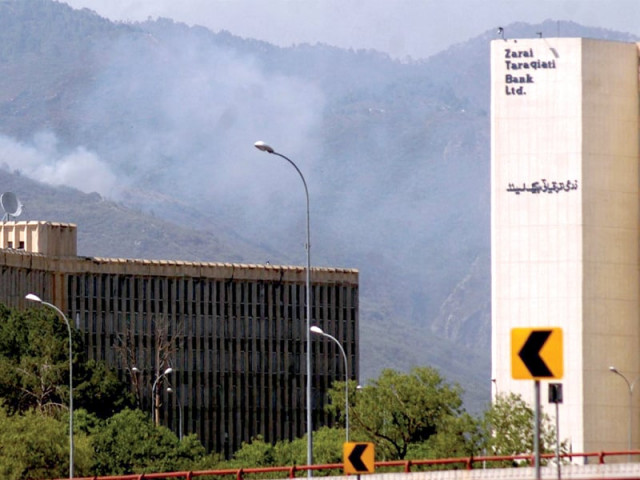Stone crushers install first dust suppression system at Margalla Hills
Around 100 stone crushers operate in the area without taking eco-friendly measures into consideration.

One stone crusher has installed a dust suppression system to settle the dust generated during the crushing process on Margalla hills. PHOTO: INP
Meanwhile, as a safety measure, another stone crusher has started using water to settle the clouds of dust that rises during the crushing process.
While still not on ‘war-footing’, the Rawalpindi District Environment Office (DEO) has recently begun efforts to limit the destructive activity of around 100 stone crushers who operate on the western end of the Margalla Hills National Park.
Although stone crushing is a major threat to the natural habitat and forestation in the national park area, the DEO is primarily focusing on the air pollution aspect of stone crushing.
The dust clouds generated while grinding boulders and rocks into fine gravel and the emissions from vehicles used to transport the gravel contribute to the high levels of airborne particulate matter in the area.
The DEO and the Pakistan Environment Protection Agency (Pak-EPA) estimate particulate emissions from stone crushing to be 33 to 40 times higher than national environment quality standards.
The DEO suggests stone crushers adopt dust suppression techniques such as wet scrubbers and sprinklers.

Khawaja Stone Crusher is perhaps the first crushing unit to experiment with such a system.
The dust suppression technology used by Khawaja Stone is not advanced or complicated. It uses tarps to cover the crushing plants where rocks are broken down into fine pebbles. Water pumped from a nearby tank is sprayed on the rocks as they are being disintegrated using regular garden hoses with shower heads attached.
Muhammad Mansha, the manager at Khawaja Stone Crusher, claimed that after installing the unit, the dust output has been reduced by 95 per cent.
Rawalpindi DEO Secretary Shaukat Hayat said the effectiveness of dust suppression is being tested by the DEO, but Hayat optimistically admitted that this is a good start for crushers who previously did not even acknowledge that their crushing plants were a source of air pollution.
Another company, Afridi Stone Crusher, is using water running through regular pipes to settle the dust.
“There used to be so much dust it was impossible to sit here,” said owner Zia Afridi while sitting in his office near the worksite. “Now, the situation is much better.”
This change of attitude among the stone crushers might be because of action taken by the Punjab Environmental Tribunal.
Most of the new stone crushers in the area work on lease permits issued by the Punjab Mines and Minerals Department. They never conducted initial environmental examinations to get a No Objection Certificate (NOC) from the provincial Environment Protection Agency (EPA) before they started work. The NOC is a legal requirement under the Pakistan Environmental Protection Act 1997, which was adopted by the Punjab government in 2012.
In February, the tribunal fined six stone crushers Rs30,000 for operating without NOCs on the basis of notices served by the DEO. The tribunal also ordered them to be fined Rs1,500 per day if they do not come into compliance within two months. The two-month period will end after the tribunal conducts its proceedings on April 11 and 12 in Rawalpindi.
Water is the main cost associated with the dust suppression mechanisms. Some of the stone crushing units, such as Khawaja and Afridi, had already invested in water through boring to provide drinking water for their staff.
“Excluding water, the other equipment for dust suppression costs less than Rs100,000,” Mansha said. “But boring alone costs nearly Rs200,000.”
Crushing units without water will have to buy water tankers if they install a suppression system. The daily charges for the water tankers might be high, but stone crushers would be wise to consider it in relation to the Rs1,500 daily fine they will have to pay for not making the arrangement.
Published in The Express Tribune, April 8th, 2013.



















COMMENTS
Comments are moderated and generally will be posted if they are on-topic and not abusive.
For more information, please see our Comments FAQ